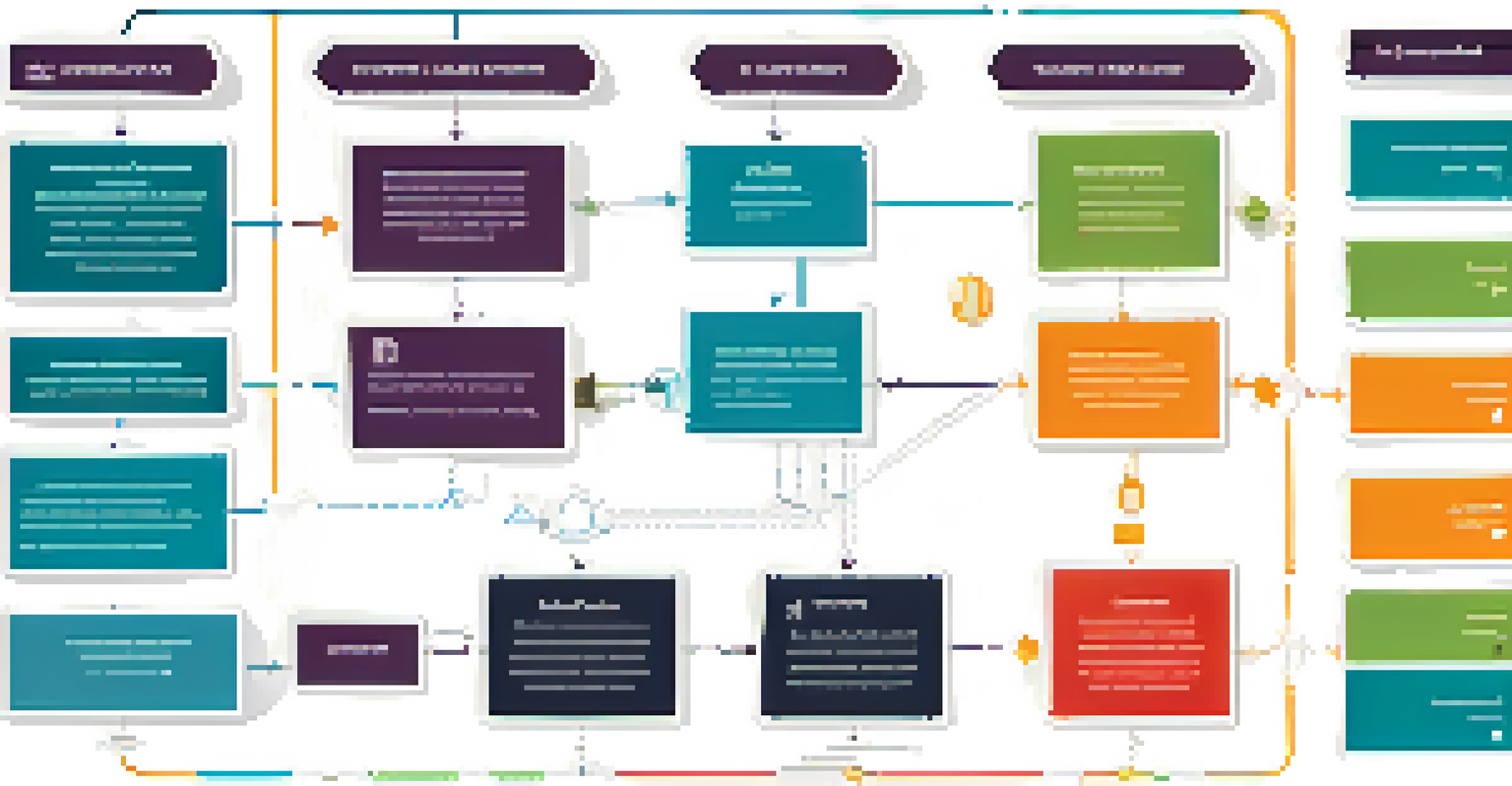The Future of Supply Chain Management: Blockchain Innovations

Understanding Blockchain: The Basics for Supply Chain
Blockchain is essentially a digital ledger that records transactions across many computers. This ensures that the recorded transactions cannot be altered retroactively, providing a secure and transparent way to track goods and services. For supply chain management, this means that every step of a product’s journey can be documented and verified, creating an unchangeable record from origin to consumer.
Blockchain is the tech. Bitcoin is merely the first mainstream manifestation of its potential.
Imagine a world where you can trace the journey of a chocolate bar from the cocoa farm to your local store. This is the power of blockchain, as it allows stakeholders to access real-time information about the product's history and authenticity. Consequently, it builds trust among consumers and businesses alike.
Moreover, this transparency can significantly reduce fraud and errors in the supply chain. By having a clear view of the entire process, companies can quickly pinpoint issues, ensuring a smoother operation and enhanced efficiency.
Enhanced Traceability: The Key to Consumer Trust
With increasing consumer demand for transparency, enhanced traceability in supply chains is more important than ever. Blockchain technology enables companies to provide detailed information about the sourcing and handling of their products, allowing consumers to make informed choices. This traceability not only fosters trust but also holds companies accountable for their practices.

For instance, when purchasing organic products, customers often want assurance that the items are genuinely organic. Blockchain can verify that the products have been certified and trace their journey, making it easier for consumers to trust what they buy. This level of transparency can be a significant selling point for brands.
Blockchain Boosts Supply Chain Trust
Blockchain technology enhances traceability and transparency, allowing consumers to verify product authenticity and fostering trust in brands.
Additionally, enhanced traceability can help companies respond swiftly to recalls or quality issues. If a problem arises, businesses can quickly trace back through the supply chain to identify and address the source of the issue, minimizing potential harm to consumers.
Smart Contracts: Automating Supply Chain Processes
One of the most exciting applications of blockchain in supply chain management is the use of smart contracts. These are self-executing contracts with the terms directly written into code. When certain conditions are met, the contract automatically executes, reducing the need for intermediaries and speeding up processes.
Transparency is the new currency of trust in business.
For example, consider a scenario where a shipment arrives at a port. A smart contract could automatically release payment to the supplier once the shipment is verified and meets quality standards. This automation not only saves time but also reduces the potential for disputes.
Moreover, smart contracts enhance accountability throughout the supply chain. With all parties involved having access to the same information, it minimizes the chances of misunderstanding and builds a more collaborative environment among suppliers and buyers.
Cost Reduction: Streamlining Supply Chain Operations
Implementing blockchain technology can lead to significant cost reductions for businesses. By streamlining operations and eliminating the need for multiple intermediaries, companies can reduce overhead costs associated with managing supply chains. This efficiency can result in lower prices for consumers as well.
For instance, traditional supply chains often involve various middlemen, each adding their own fees. However, blockchain allows for direct transactions between parties, cutting down these additional costs. This not only simplifies the process but also makes it more economically viable.
Smart Contracts Automate Processes
The implementation of smart contracts in supply chains streamlines operations by automatically executing agreements when specific conditions are met.
Additionally, the reduction of errors and fraud can lead to fewer financial losses. By ensuring accuracy through transparent and verifiable transactions, companies can save money that would otherwise go towards resolving disputes or dealing with fraud.
Sustainability in Supply Chains: A Blockchain Approach
As sustainability becomes a critical focus for businesses worldwide, blockchain offers innovative solutions to track and verify sustainable practices. Companies can utilize blockchain to trace the environmental impact of their supply chains, ensuring compliance with sustainability standards. This capability helps businesses demonstrate their commitment to ethical practices.
For example, a fashion retailer can use blockchain to verify that their materials are sourced from sustainable suppliers. Customers can scan a QR code on the product to access its entire lifecycle, from raw material to finished product, reinforcing the brand's commitment to sustainability.
This not only attracts eco-conscious consumers but also helps companies adhere to regulations and avoid potential penalties. With growing scrutiny on corporate practices, having a transparent and verifiable supply chain can be a significant competitive advantage.
Challenges Facing Blockchain Adoption in Supply Chains
Despite its promising benefits, the adoption of blockchain in supply chain management is not without challenges. One significant hurdle is the need for industry-wide collaboration and standardization. Without a common framework, different companies may struggle to integrate their systems, hindering the full potential of blockchain.
Additionally, there are concerns about data privacy and security. While blockchain is known for its security features, companies must carefully consider what information is shared across the network. Ensuring that sensitive information remains protected while still reaping the benefits of transparency is a delicate balance.
Cost Savings Through Efficiency
By reducing intermediaries and errors, blockchain can significantly lower operational costs for businesses, benefiting consumers with better prices.
Moreover, the initial investment in blockchain technology can be significant. Businesses must weigh the costs of implementation against the long-term benefits, making it crucial to have a clear strategy before diving in.
The Future of Supply Chain Management with Blockchain
Looking ahead, the future of supply chain management appears bright with blockchain technology at the forefront of innovation. As more companies recognize the benefits of this technology, we can expect to see wider adoption across various industries. This shift could lead to more efficient, transparent, and sustainable supply chains.
Moreover, the integration of emerging technologies like artificial intelligence (AI) and the Internet of Things (IoT) with blockchain could further enhance supply chain capabilities. For instance, AI could analyze data from blockchain to predict demand trends, allowing businesses to respond more proactively.

Ultimately, the evolution of supply chain management will hinge on how well companies embrace these innovations. By prioritizing collaboration, investment, and adaptability, businesses can position themselves to thrive in this new landscape.